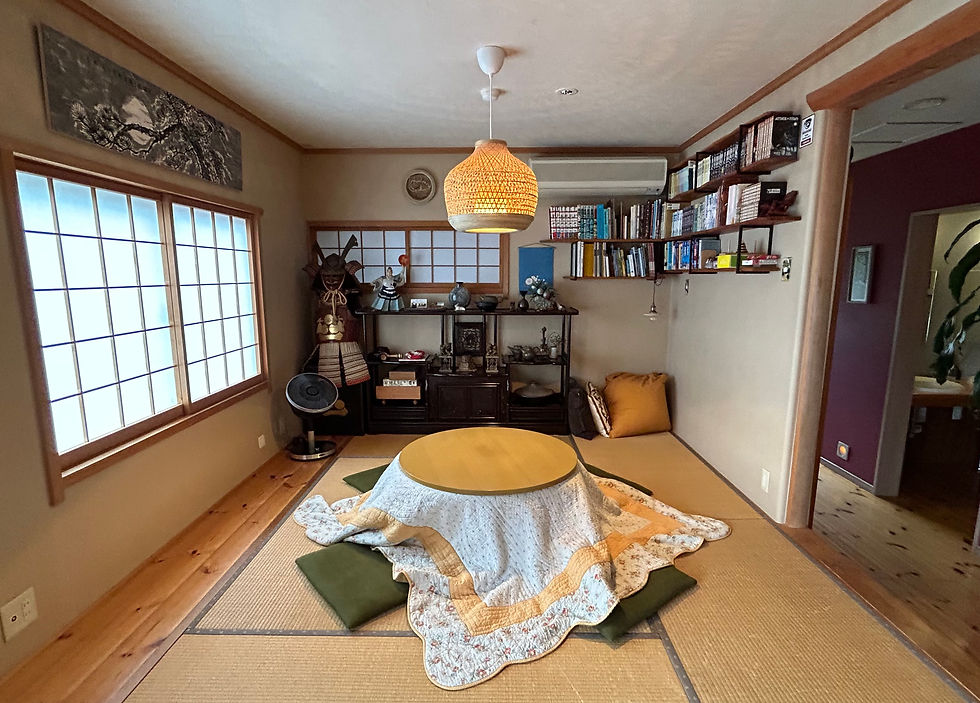Onsen Day
- Fred Van Liew
- May 7, 2023
- 3 min read
The rain that began as we descended from the Shrine, followed us all the way to Kurokawa and Hostel Aso Base. Through the night it continued, a downpour at times, pausing at others, providing false hope of a cloudless sky in the morning.

But it wasn’t to be.
Pa, ever practical, suggested we get to know our new way station and perhaps visit an onsen. I’ve come to appreciate Pa’s outlook. Though highs and lows do not exist within his emotional range, his refined Stoicism makes him well suited as a traveling companion, and as an ancestor.
The Aso Base,

is a welcoming place,

Japanese in its taste

and simplicity.

While there’s no food on site, tea and coffee can be had anytime of day or night.

And Pa and I both agree that the bed is as comfortable as any we’ve slept on.

There’s a gentleman at the front desk. About forty, but it’s difficult to know as the Japanese age so well. He’s a quiet man, quite efficient in his tasks. I’ve approached him a few times and come to like him. He has a gentle soul, an old soul. Pa and I believe that a deep Shinto lineage resides within him.
At about noon, the rain had become mist so we inquired of the man if there might be an onsen nearby. By the way, an onsen is a natural hot spring bath. Heated by underground volcanic activity, they’re found all over Japan. Beppu’s many onsens are heated by eight separate hot springs. Kurokawa has only one spring, but it serves a handful of onsens well.
The man told us the best happens to be the closest, just a short distance from Aso Base.
The Aso Bachu Onsen is family owned and generally only visited by locals. It’s only 400 yen but you must take your own towel.
He then described the route:
Take a right out of the parking lot. Walk five minutes, no more. You will see Usopp,

he can’t be missed.
Take a left at the station,

a right onto the lane,

then the first left,

and you’re there.

We followed his directions to the letter and were greeted by two women with slippers who provided assistance with the machine that dispenses entry tickets.

They were sweet women, grandmotherly in the best of ways. Once my shoes, jacket and valuables were placed in a locker, they escorted us to where a right must be taken,

and the entrance beyond through which only men can pass.

I apologize, but we took no photos thereafter as there were at least six to eight patrons present at any one time during our visit.
What I can tell you, had I to do it over again, is that I would own an onsen rather than be a lawyer. Pa and I are convinced that onsens contribute to a stable society far better than any judicial system.
You can see it in the men, how they prepare, still tense from the outside world. But then they shower, seated on tiny stools, pouring warm buckets of water over their head and body. Most shampoo and scrub their limbs and torsos as well. They then proceed to the sauna, sitting in silence with their brethren for far longer than Pa and I could tolerate. Next is the large hot bath, where most sit on the side but a few step down and recline, only their heads above water.
After whatever length of time they choose, each stops for a brief dip in the cold pool before showering again and dressing.
We followed the routine as best we could. And once back in the changing room observed the demeanor of those who came after. It was as close as either of us had ever seen to a communal re-birth.
Japan is not cursed with alcoholism and addiction to the extent most western countries are. You have to wonder if an onsen in every neighborhood might go a long way toward solving our problems.








Comments